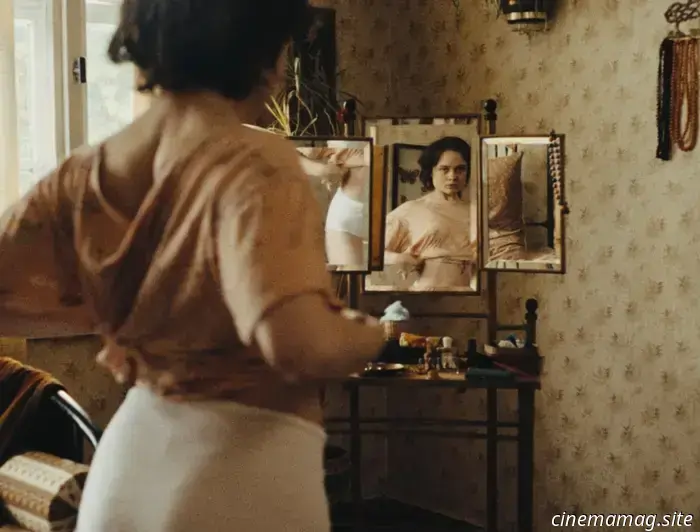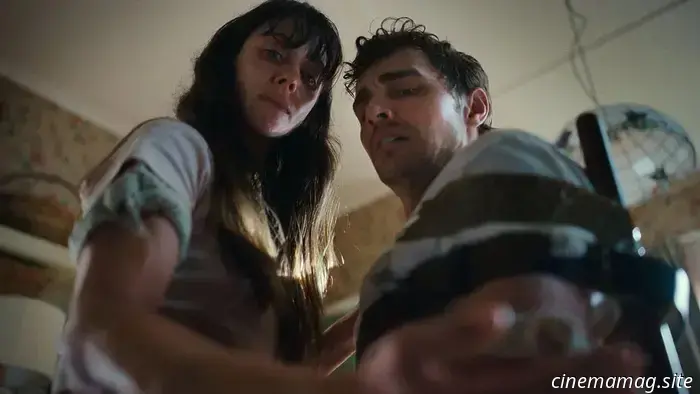
Cannes Review: Sound of Falling is a Psychosexual Fever Dream of Grand Proportions
German writer-director Mascha Schilinski’s second feature, *Sound of Falling*, is the first film in competition to be showcased at Cannes this year. If this is any indication, we might be in for a classic festival edition. Set on a farm in northern Germany over the span of a century, this highly experimental and profoundly unsettling narrative explores the destinies of women and their historical echoes, resembling a psychosexual fever dream of grand proportions. While it may perplex and disturb many, devoted cinephiles can note this as their next obsession. It’s quite an impressive experience.
Given the film's bold and unconventional nature, viewers would do well to be aware of a few elements prior to watching. To begin, there are numerous characters. The narrative spans generations and explores the relationships among the farm's residents from different eras. In the early 20th century, the central character and primary narrator is a young girl named Alma. Bright and intensely observant, Alma meticulously details the strange occurrences around her. From her uncle Fritz's loss of a leg to her aunt Erika’s obsession with him, and the mistreatment of maids on the farm, she has witnessed horrifying events, sharing them with unsettling clarity. In the post-WWII era, the sincere and imaginative Angelika serves as our guide, revealing her toxic relationship with cousin Rainer and uncle Uwe under the communist GDR regime, along with the various humiliations her mother Irm endures. Contemporary events are primarily presented through the perspective of Lenka, a socially awkward teenager who observes her friend Nelly's death and has a crush on the cool girl, Kaya.
Compounding the numerous names and faces is a fragmented, non-linear narrative that shifts between timelines and plots without transitions, adding to the disorientation. Especially in the first hour, viewers may find themselves confused about the context and the characters’ situations. However, even at its most challenging, *Sound of Falling* mesmerizes with a rich, alluring visual style. The opening sequences exemplify this: a one-legged woman stumbles into view, only to reveal she is pretending to be disabled, while a little girl and her sisters are chased around the house by a housekeeper, laughing joyfully. Suddenly, only the girl remains in the frame, and silence descends. In many introductory scenes, one may not comprehend what they see but still feel drawn into the mystery.
Perhaps the most enigmatic aspect of Schilinski’s storytelling is the connections glimpsed between different time periods. At crucial moments, characters appear to catch a glimpse of the past or future, encountering their counterparts in a similar predicament. While these intuitions or premonitions are never fully explained, they create a haunting sense of continuity and capture something essential and timeless regarding the struggles faced by women.
Cinematographer Fabian Gamper crafts images that are imaginative and bold. They not only captivate the eye but also provide *Sound of Falling* with the eerie, surreal feel of nightmares. Although much of it unfolds in darkness at night, Gamper’s work—reminiscent of Lol Crawley's style in *The Childhood of a Leader*—crackles with foreboding. Composers Michael Fiedler and Eike Hosenfeld, along with the entire sound team, deserve recognition for creating a tense, claustrophobic auditory environment that reflects the inescapable cycles the characters endure.
The extensive, mostly female cast forms a striking and cohesive ensemble. Nine-year-old Hanna Heckt, portraying Alma, impresses particularly: whether through her calm demeanor, penetrating gaze, or innocent smiles, her performance as a child who has seen too much is haunting.
Ultimately, *Sound of Falling* is a testament to Schilinski's vision and unwavering choices. While it may not conclude on a high note, which is a minor drawback, for much of its 149-minute runtime, viewers are deeply engaged with a unique storyteller. A notable scene features Angelika taking a family photo with a newly acquired magical device called a camera. An unexpected moment transpires at the scene's conclusion. Without relying on jump scares or special effects, Schilinski allows a photograph to convey the strangeness of the situation, chilling the viewer to the core. This exemplifies effective, inspired direction.
*Sound of Falling* premiered at the 2025 Cannes Film Festival.

Other articles
 Alison Brie and Dave Franco are accused of plagiarizing their project "Together," which was a successful hit at Sundance that sold for $17 million.
On Tuesday, a lawsuit was submitted claiming that Dave Franco and Alison Brie appropriated the concept for their upcoming body-horror movie Together, which NEON acquired from the
Alison Brie and Dave Franco are accused of plagiarizing their project "Together," which was a successful hit at Sundance that sold for $17 million.
On Tuesday, a lawsuit was submitted claiming that Dave Franco and Alison Brie appropriated the concept for their upcoming body-horror movie Together, which NEON acquired from the
 Outback is now part of Hiya Toys' G.I. Joe Exquisite Mini Series action figure lineup.
Hiya Toys has officially revealed that Stuart ‘Outback’ Selkirk will be introduced in its G.I. Joe Exquisite Mini Series, featuring a new 1/18th scale action figure for the Joes' survival expert. The figure is slated for shipment in Q2 2016 and is currently available for pre-order at a price of $24.99; take a look at the official promotional images and details […]
Outback is now part of Hiya Toys' G.I. Joe Exquisite Mini Series action figure lineup.
Hiya Toys has officially revealed that Stuart ‘Outback’ Selkirk will be introduced in its G.I. Joe Exquisite Mini Series, featuring a new 1/18th scale action figure for the Joes' survival expert. The figure is slated for shipment in Q2 2016 and is currently available for pre-order at a price of $24.99; take a look at the official promotional images and details […]
 Get ready for ten incredible action movies you may have overlooked… There's a classic genre that continually draws in large crowds, from theaters to streaming platforms. It's action! Whether featuring cowboys, commandos, or anything in between, a great action film gets the heart racing and delivers an exhilarating ride for viewers.
Get ready for ten incredible action movies you may have overlooked… There's a classic genre that continually draws in large crowds, from theaters to streaming platforms. It's action! Whether featuring cowboys, commandos, or anything in between, a great action film gets the heart racing and delivers an exhilarating ride for viewers.
Cannes Review: Sound of Falling is a Psychosexual Fever Dream of Grand Proportions
German writer-director Mascha Schilinski’s second feature, Sound of Falling, is the first competition entry to be shown at Cannes this year. If this serves as an indication, we could be in for a memorable edition of the festival. Taking place on a farm in northern Germany over the span of a century, this highly experimental and profoundly disturbing film.
